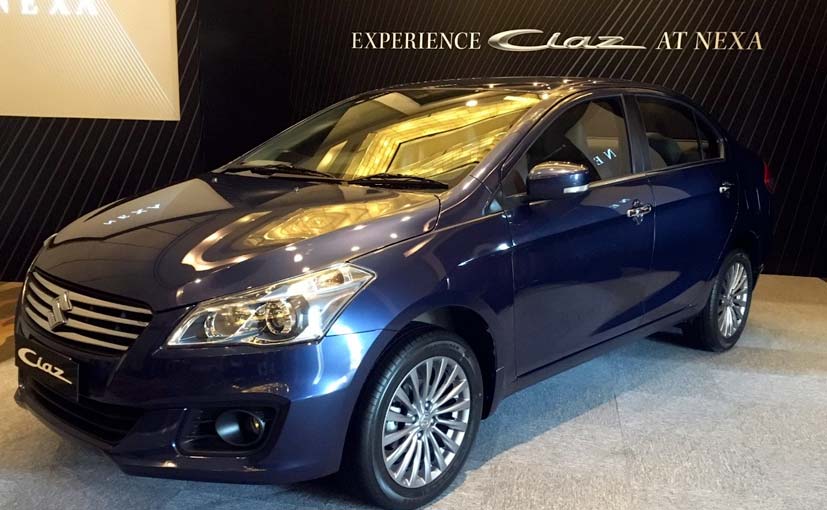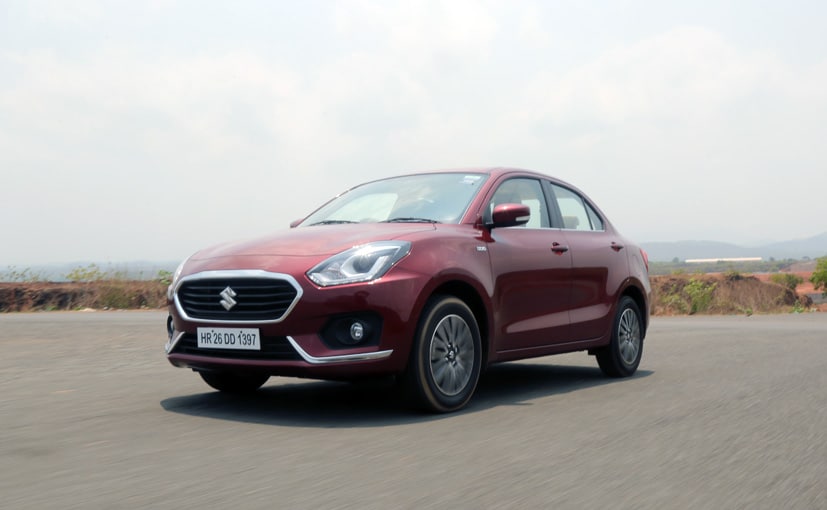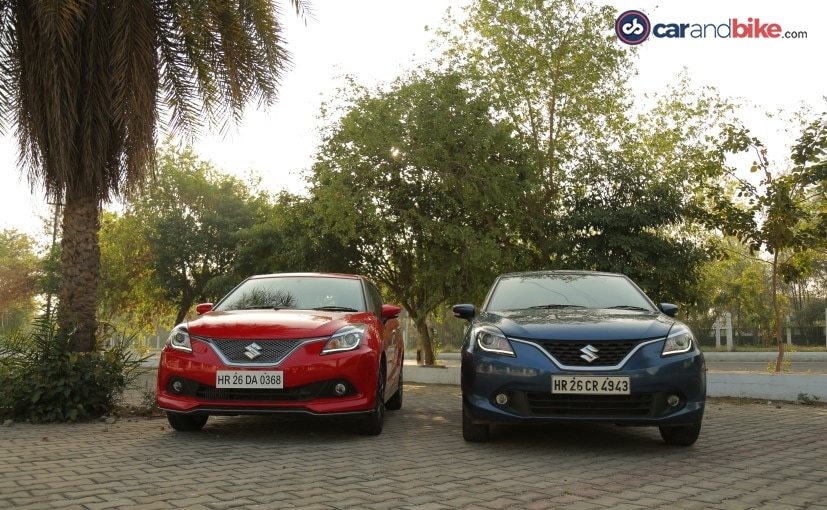Maruti Suzuki Reduces CO2 Emissions Nearly 20% In Last Decade
Maruti Suzuki, Indias largest car maker have put out the figures that shows the decrease in overall CO2 emissions from its range of vehicles over the last decade. The drop in CO2 emissions has been attributed to better technology for both its petrol and diesel power plants, new generation engines altogether and the introduction of start-stop technology like mild-hybrid systems that are currently available in the Ertiga and the Ciaz. The addition of several CNG equipped models right from the factory floor in the Maruti Suzuki lineup have also added to the drop in emissions along with new platforms that have dramatically decreased overall weight and are more mechanically efficient.

Highlights
- The 20 percent cut in emissions is due to updated engines and platforms
- Lighter platforms with better efficiency result in lower CO2 emissions
- CNG and mild-hybrid tech has also helped to reduce overall emissions
Maruti Suzuki, India’s largest carmaker has put out the figures that shows the decrease in overall CO2 emissions from its range of vehicles over the last decade. The drop in CO2 emissions has been attributed to better technology for both its petrol and diesel power plants, new generation engines altogether and the introduction of start-stop technology like mild-hybrid systems that are currently available in the Ertiga and the Ciaz. The addition of several CNG equipped models right from the factory floor in the Maruti Suzuki lineup have also added to the drop in emissions along with new platforms that have dramatically decreased overall weight and are more mechanically efficient.

The drop in CO2 is also attributed to the introduction of stricter emissions control norms in India like BS4. BS4 was initiated in the National Capital Region and 13 other major cities in April 2010 and was mandatory for the whole country earlier this year on April 1, 2017. Instead of running two engine tunes in parallel, one serving BS4 norms and one serving BS3 ones, Maruti Suzuki had taken a conscious call in 2010 to move all their cars in one go to the BS4 norms across the country for all models and all cities. This move too has helped Maruti with the overall drop in CO2 emissions across the last decade.
Also Read: BS3 vs BS4 vehicle differences
As we mentioned earlier, new platforms too have helped decrease weight by a substantial margin which in turn has improved overall mechanical efficiency of the vehicles as a single entity. This in turn has also improved fuel efficiency and in turn has resulted in less tail pipe emissions. In fact, the most fuel efficient car in the country today is the newly launched and quite impressive Maruti Suzuki Dzire diesel in both Automatic and manual versions.
Also Read: New Maruti Suzuki Dzire Review

Speaking on the drop of CO2 emissions, C V Raman, Executive Director (Engineering) at Maruti Suzuki India said, “In the last few years, Maruti Suzuki has worked systematically towards reducing vehicle emissions and achieved new benchmarks. The company has been consciously introducing innovative technologies to make the products environment friendly. We work on platform strategy and keep on rationalizing them to offer better value to the customers by better fuel efficiency and better performance, which leads to reduction in emissions. Going forward, we will continue our focus on investing in new technologies and strengthen our capability to bring down emissions per vehicle by enhancing fuel efficiency of our cars.”

Maruti Suzuki have also cut down on other types of emissions that result from an automobile. This includes noise emissions from the engine and exhaust output which has seen a sharp decline in the last few years, especially in petrol engines. Maruti is also working on ways to make its products as recyclable as possible so as to ensure minimal pollutants from a car at the end of its life cycle.

Maruti Suzuki Ciaz NEXA
The drop in CO2 is also attributed to the introduction of stricter emissions control norms in India like BS4. BS4 was initiated in the National Capital Region and 13 other major cities in April 2010 and was mandatory for the whole country earlier this year on April 1, 2017. Instead of running two engine tunes in parallel, one serving BS4 norms and one serving BS3 ones, Maruti Suzuki had taken a conscious call in 2010 to move all their cars in one go to the BS4 norms across the country for all models and all cities. This move too has helped Maruti with the overall drop in CO2 emissions across the last decade.
Also Read: BS3 vs BS4 vehicle differences
As we mentioned earlier, new platforms too have helped decrease weight by a substantial margin which in turn has improved overall mechanical efficiency of the vehicles as a single entity. This in turn has also improved fuel efficiency and in turn has resulted in less tail pipe emissions. In fact, the most fuel efficient car in the country today is the newly launched and quite impressive Maruti Suzuki Dzire diesel in both Automatic and manual versions.
New Maruti Suzuki Dzire Automatic
Speaking on the drop of CO2 emissions, C V Raman, Executive Director (Engineering) at Maruti Suzuki India said, “In the last few years, Maruti Suzuki has worked systematically towards reducing vehicle emissions and achieved new benchmarks. The company has been consciously introducing innovative technologies to make the products environment friendly. We work on platform strategy and keep on rationalizing them to offer better value to the customers by better fuel efficiency and better performance, which leads to reduction in emissions. Going forward, we will continue our focus on investing in new technologies and strengthen our capability to bring down emissions per vehicle by enhancing fuel efficiency of our cars.”

Maruti Suzuki have also cut down on other types of emissions that result from an automobile. This includes noise emissions from the engine and exhaust output which has seen a sharp decline in the last few years, especially in petrol engines. Maruti is also working on ways to make its products as recyclable as possible so as to ensure minimal pollutants from a car at the end of its life cycle.
# Maruti Suzuki# Maruti Dzire# maruti suzuki emission# maruti ciaz# maruti new car# Auto Industry# Technology
Stay updated with automotive news and reviews right at your fingertips through carandbike.com's Google News
Related Articles
Latest News
Popular Maruti Suzuki Models
 Maruti Suzuki FronxEx-Showroom Price₹ 7.52 - 13.13 Lakh
Maruti Suzuki FronxEx-Showroom Price₹ 7.52 - 13.13 Lakh Maruti Suzuki ErtigaEx-Showroom Price₹ 8.84 - 13.13 Lakh
Maruti Suzuki ErtigaEx-Showroom Price₹ 8.84 - 13.13 Lakh Maruti Suzuki EecoEx-Showroom Price₹ 5.44 - 6.7 Lakh
Maruti Suzuki EecoEx-Showroom Price₹ 5.44 - 6.7 Lakh Maruti Suzuki Alto K10Ex-Showroom Price₹ 4.23 - 6.21 Lakh
Maruti Suzuki Alto K10Ex-Showroom Price₹ 4.23 - 6.21 Lakh Maruti Suzuki SwiftEx-Showroom Price₹ 6.49 - 9.65 Lakh
Maruti Suzuki SwiftEx-Showroom Price₹ 6.49 - 9.65 Lakh Maruti Suzuki Wagon REx-Showroom Price₹ 5.65 - 7.36 Lakh
Maruti Suzuki Wagon REx-Showroom Price₹ 5.65 - 7.36 Lakh Maruti Suzuki InvictoEx-Showroom Price₹ 25.21 - 28.92 Lakh
Maruti Suzuki InvictoEx-Showroom Price₹ 25.21 - 28.92 Lakh Maruti Suzuki S-PressoEx-Showroom Price₹ 4.27 - 6.12 Lakh
Maruti Suzuki S-PressoEx-Showroom Price₹ 4.27 - 6.12 Lakh Maruti Suzuki IgnisEx-Showroom Price₹ 5.49 - 8.11 Lakh
Maruti Suzuki IgnisEx-Showroom Price₹ 5.49 - 8.11 Lakh Maruti Suzuki JimnyEx-Showroom Price₹ 12.74 - 14.95 Lakh
Maruti Suzuki JimnyEx-Showroom Price₹ 12.74 - 14.95 Lakh Maruti Suzuki XL6Ex-Showroom Price₹ 11.61 - 14.61 Lakh
Maruti Suzuki XL6Ex-Showroom Price₹ 11.61 - 14.61 Lakh Maruti Suzuki CelerioEx-Showroom Price₹ 5.64 - 7.37 Lakh
Maruti Suzuki CelerioEx-Showroom Price₹ 5.64 - 7.37 Lakh Maruti Suzuki BalenoEx-Showroom Price₹ 6.66 - 9.88 Lakh
Maruti Suzuki BalenoEx-Showroom Price₹ 6.66 - 9.88 Lakh Maruti Suzuki CiazEx-Showroom Price₹ 9.4 - 12.35 Lakh
Maruti Suzuki CiazEx-Showroom Price₹ 9.4 - 12.35 Lakh Maruti Suzuki Grand VitaraEx-Showroom Price₹ 10.99 - 19.93 Lakh
Maruti Suzuki Grand VitaraEx-Showroom Price₹ 10.99 - 19.93 Lakh Maruti Suzuki BrezzaEx-Showroom Price₹ 8.54 - 13.98 Lakh
Maruti Suzuki BrezzaEx-Showroom Price₹ 8.54 - 13.98 Lakh Maruti Suzuki 2025 New DzireEx-Showroom Price₹ 6.79 - 10.14 Lakh
Maruti Suzuki 2025 New DzireEx-Showroom Price₹ 6.79 - 10.14 Lakh














